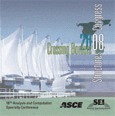Reinforced Glass Beams: Effect of Increased Temperatures on the Glass-to-Reinforcement Adhesive Bond
Publication: Structures Congress 2008: Crossing Borders
Abstract
For several years the Glass & Transparency research group at Delft University of Technology has been working on safety concepts for glass structures and structural glass components. In contrast with common `safety' approaches, the developed safety concepts do not rely on overdimensioning, but aim at controlled and ductile failure behaviour. Since glass itself is a brittle material, the research group focuses on the development of glass-composite concepts in which the ductility is obtained by a combined action of glass and a ductile material [1]. One of the concepts currently under investigation is the `reinforced glass beam' concept [2]. This concept makes use of a stainless steel reinforcement, which is adhesively bonded to the edge of an annealed float glass beam. Similar to reinforced concrete this reinforcement section will act as a crack bridge, taking up the tensile forces once the glass has cracked due to unforeseen circumstances. The reinforcement section will provide redundancy to the system, the tensile forces will be taken up by the reinforcement while the compressive forces will be taken up by the uncracked compression zone. This way safe and ductile failure behaviour is obtained. An important aspect of the reinforced glass beam concept is the adherence of the reinforcement to the glass. Since all interaction between glass and reinforcement is dependent on this adhesive bond, it has to service under all conditions. A very important condition is an increased serviceability temperature, since e.g. glass roofs are often exposed to direct sunlight radiation. The effect of increased temperatures on the adhesive bond has been investigated in cooperation with glass-researchers at Ghent University. For this research a climatic room at Ghent University has been equipped with a 4-point bending test setup. A total of thirty 1.5 m reinforced glass beam specimens have been stored for at least 24 hours at 60°C, before being tested in 4-point bending at this same temperature level. Using this method, six different adhesives have been investigated. Results show the acrylic specimens performed best.
Get full access to this article
View all available purchase options and get full access to this chapter.
Information & Authors
Information
Published In
Copyright
© 2008 American Society of Civil Engineers.
History
Published online: Apr 26, 2012
ASCE Technical Topics:
- Adhesives
- Beams
- Bonding
- Building materials
- Colleges and universities
- Design (by type)
- Ductility
- Education
- Engineering fundamentals
- Engineering materials (by type)
- Glass
- Material mechanics
- Material properties
- Materials engineering
- Materials processing
- Measurement (by type)
- Mechanical properties
- Practice and Profession
- Structural design
- Structural engineering
- Structural members
- Structural systems
- Structure reinforcement
- Temperature effects
- Temperature measurement
Authors
Metrics & Citations
Metrics
Citations
Download citation
If you have the appropriate software installed, you can download article citation data to the citation manager of your choice. Simply select your manager software from the list below and click Download.
